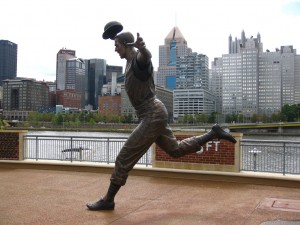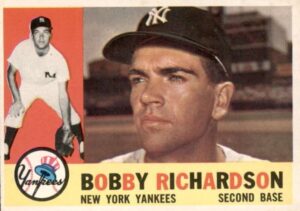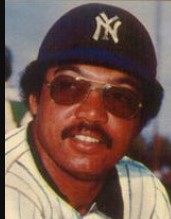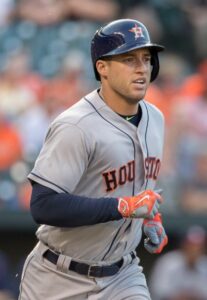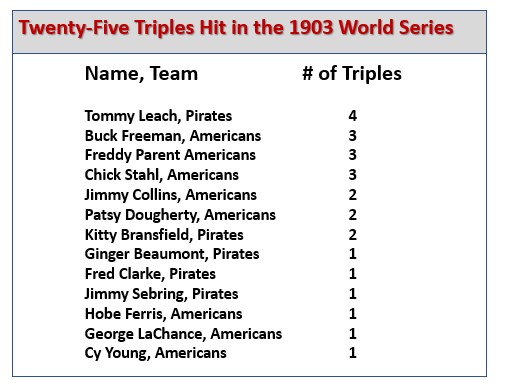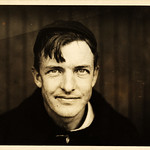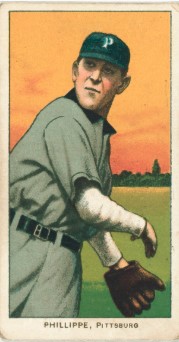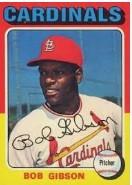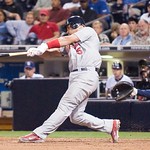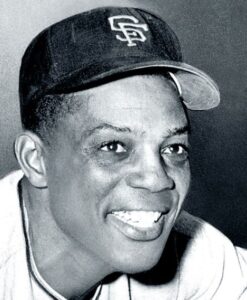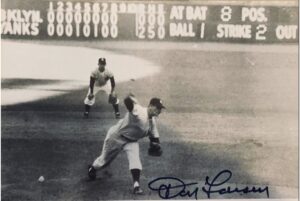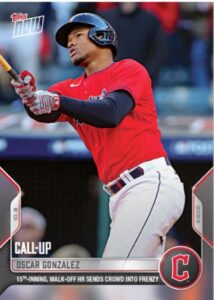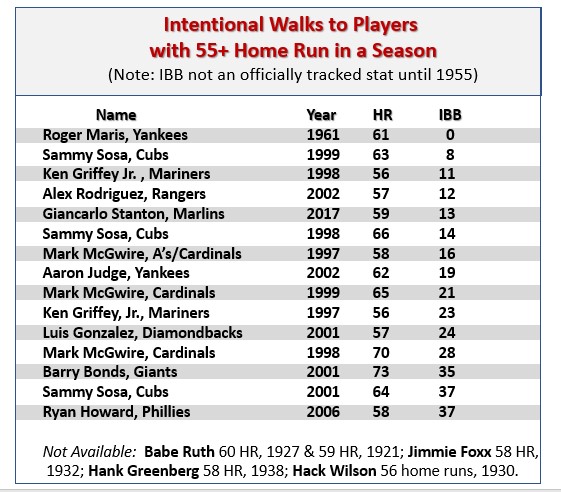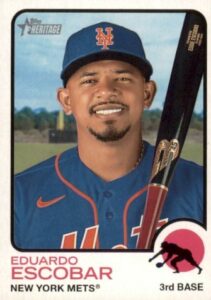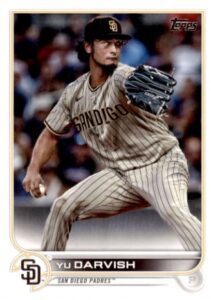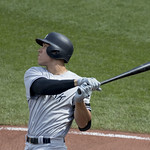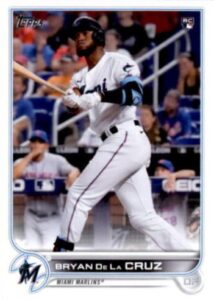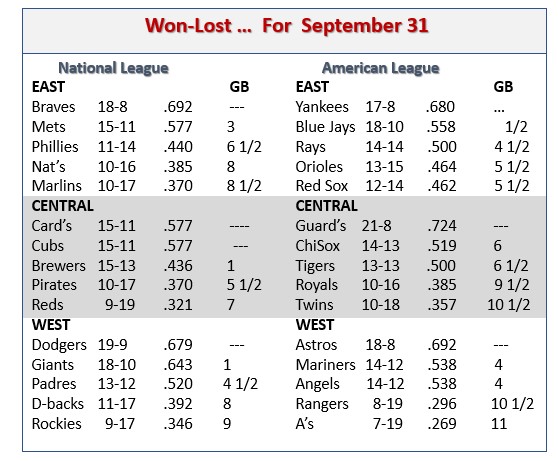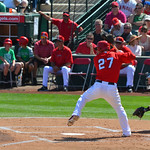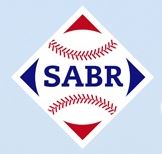With the 2022 World Series about to start, I find myself (as usual) reflecting on World Series past. In my two most-recent posts, I’ve looked at record-setting single-game World Series performances (click here for that post) and single World Series marks (click here). In this post, I am reflecting on a handful of World Series – and specific games – that I recall fondly. These are not necessarily the brightest and best of past World Series. They are just a few that have a special place in my memory and heart. The reasons are varied: a home-team connection, a favorite player, an iconic moment – you get the idea.
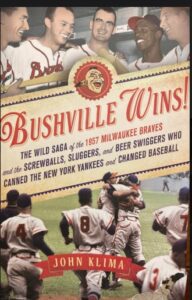 Number-One … The 1957 World Series – won by the Braves (of my hometown Milwaukee) over the Yankees. I was just ten-years-old and already a baseball fanatic. I most fondly remember Game Four when Eddie Mathews (my childhood hero and still all-time favorite player) hit a two-run, tenth-inning walk-off home run to win the game. The whole experience was made all the sweeter by the fact that my Braves were significant underdogs – and the city of Milwaukee was getting no “love.” (One of the Yankees’ traveling staff was reportedly even quoted as referring to Milwaukee as “Bush League.”)
Number-One … The 1957 World Series – won by the Braves (of my hometown Milwaukee) over the Yankees. I was just ten-years-old and already a baseball fanatic. I most fondly remember Game Four when Eddie Mathews (my childhood hero and still all-time favorite player) hit a two-run, tenth-inning walk-off home run to win the game. The whole experience was made all the sweeter by the fact that my Braves were significant underdogs – and the city of Milwaukee was getting no “love.” (One of the Yankees’ traveling staff was reportedly even quoted as referring to Milwaukee as “Bush League.”)
New York at the Center of the Baseball World
In the ten seasons prior to 1957:
- The Yankees had won seven of the ten World Series;
- New York-based teams had won nine of ten Series titles;
- There were seven all-New York World Series;
- Of the twenty World Series “slots,” 16 were filled by New York -based teams,
My Braves upset the favored Yankees four games-to-three in a Series that featured the likes of Hank Aaron, Eddie Mathews and Warren Spahn on one side and Mickey Mantle, Yogi Berra and Whitey Ford on the other. Not a bad World Series to start your Fall Classic memory bank on. The hero, star and MVP of the Series, however, was Braves’ righty “Fidgety” Lew Burdette (a former Yankee), who won three games versus the Yankees (all complete games – two shutouts) and gave up just two runs in 27 innings pitched.
“He (Lew Burdette) could make coffee nervous.”
Braves Manager Fred Haney.
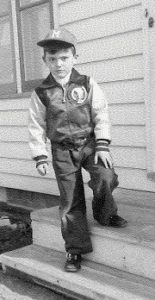 As a kid, I was focused not only on the stars (and Hall of Famers), but also on a rookie Braves’ outfielder named Bob “Hurricane” Hazle, who had been called up in late July (due to an injury to the Braves’ Billy Bruton) and had taken MLB by storm – playing a notable role in getting the Braves to the Fall Classic. Hazle (whose previous MLB experience had been six games with the Reds in 1955 – three singles in 13 at bats) played in 41 of the Braves last 55 regular-season games – hitting .403, with seven home runs and 27 RBI. (He also walked 18 times versus 15 strikeouts.) While Hazle hit just .154 in four World Series Games, he did collect two hits and score a pair of runs in the Braves’ 5-0 win in the seventh and deciding game.
As a kid, I was focused not only on the stars (and Hall of Famers), but also on a rookie Braves’ outfielder named Bob “Hurricane” Hazle, who had been called up in late July (due to an injury to the Braves’ Billy Bruton) and had taken MLB by storm – playing a notable role in getting the Braves to the Fall Classic. Hazle (whose previous MLB experience had been six games with the Reds in 1955 – three singles in 13 at bats) played in 41 of the Braves last 55 regular-season games – hitting .403, with seven home runs and 27 RBI. (He also walked 18 times versus 15 strikeouts.) While Hazle hit just .154 in four World Series Games, he did collect two hits and score a pair of runs in the Braves’ 5-0 win in the seventh and deciding game.
Side note: Bob Hazle got off to a slow start in 1958, hitting just .179 in 20 games with the Braves before being sent to the Tigers. He finished the season as .211-2-10 in 63 games and did not play in the major leagues again. Still, he finished with a career MLB average of .310.
____________________________________
Number-Two … The 1960 World Series won by the upstart Pirates over the Yankees – despite the fact that the Yankees outscored the Pirates 55-27, outhit them .338 to .256 and out-homered them 10-4.
In 1960, the New York Yankees set the record for the highest batting average, most hits and most run scored (55) in a World Series (seven-game format) – and lost to the Pirates four games-to- three.
I took great pleasure in this one for a couple of reason. First, the Yankees were still considered the titans of baseball and so this was a true upset. Second, I saw this as payback for 1958, when the Yankees came back from being down three games-to-one to beat my Braves in the World Series.
I most fondly remember Game Seven – a see-saw battle won by Pirates 10-9 on a walk-off home run in the bottom of the ninth by Bill Mazeroski. As a Karpinski, I always rooted for MLB’s “skis.” For more on this World Series, click here.
Yankee second baseman Bobby Richardson drove in a World Series record 12 runs and was selected as the WS Most Valuable Player – still the only WS MVP from a losing squad.
For the Record – But Not for the Win
In 1964, Bobby Richardson added to his World Series resume, setting the record for base hits in a World Series (seven-game format), going 13-for-32 (.406) against the Cardinals. The Yankees lost that series four-game to three.
____________________________________________________
Number Three … The 1991 World Series, when my Twins (I moved to Minnesota in 1969) topped the Braves four games to three. I most fondly remember the tension of Game Seven (I was in the park for Games Two and Seven), when Jack Morris (the Series MVP) pitched a ten-inning, complete-game shutout for 1-0 win. The Series was actually filled with tension, including five one-run ball games – three decided in extra innings,
Worst -to first
The 1991 World Series was the first Fall Classic in which two teams that had finished in last place the previous season advanced to the World Series. In 1990, the Braves finished last in the NL West at 65-97, while the Twins finished in the cellar of the AL West as 74-88).
I recall lots of tension filled innings and the fact that Mark Lemke (a .234 hitter in the regular season) torched Twins pitching for a .417 average with three triples (he had just two three-baggers in 136 games during the regular season).
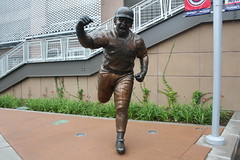
Like Mazeroski, Kirby Pucket tgot a statue. Photo by compujeramey 
Before Game Six – a must-win for the Twins – in the 1991 World Series, Twins star center-fielder Kirby Puckett told is teammates “You guys should jump on may back tonight, I’m going to carry us.” Puckett then backed up his words with a run-saving leaping catch in the third inning – along with a three-for-four (two runs, three RBI ) game that include walk-off home run in the bottom of the eleventh inning to give the Twins a 4-3 win.
The next game was, of course, Jack Morris’ ten-inning, complete-game shutout that gave the Twin a 1-0 win and the Series title (and Morris the Series MVP Award).
_______________________________________
 Number Four … The 1988 World Series, as the, as the Dodgers topped the A’s in five games. Who can forget gimpy Dodger Kirk Gibson’s iconic, pinch-hit, walk-off home run off premier closer Dennis Eckersley to end Game One. I also recall fondly how capably and enthusiastically former Twin (and a favorite of mine) Mickey Hatcher filled in for Gibson during the Series (hitting .368 with two homers). To this day, I still feel Hatcher should have shared the Series MVP award with Oral Hershiser, who picked up two complete-game wins for the Dodgers. Hatcher, who hit .293, with just one home run and 25 RBI in 88 regular-season games, hit .368, with two home runs and five RBI in the five-game World Series.
Number Four … The 1988 World Series, as the, as the Dodgers topped the A’s in five games. Who can forget gimpy Dodger Kirk Gibson’s iconic, pinch-hit, walk-off home run off premier closer Dennis Eckersley to end Game One. I also recall fondly how capably and enthusiastically former Twin (and a favorite of mine) Mickey Hatcher filled in for Gibson during the Series (hitting .368 with two homers). To this day, I still feel Hatcher should have shared the Series MVP award with Oral Hershiser, who picked up two complete-game wins for the Dodgers. Hatcher, who hit .293, with just one home run and 25 RBI in 88 regular-season games, hit .368, with two home runs and five RBI in the five-game World Series.
Kirk Gibson, despite being a league MVP (NL-1988) and AL Championship Series MVP (Tigers – 1984) never made an All Star Team in his 17-season MLB career.
___________________________________________
Number Five … The 1987 World Series (I attended this one), as My twins topped the favored Cardinal four-games to three – with Kirby Puckett‘s four-for-four performance in Game six being a key factor. What I remember most fondly as the enthusiasm of the fans and the spectacle of 40,000+ homer hankies waving wildly in the stands. Pure excitement!
The stage (and tone) for the 1987 World Series (for Minnesotan) was set when the Twins returned home after topping the Tigers in the American League Championship Series. On the flight home, they were told a few thousand fans were waiting at the Metrodome to welcome back the victorious warriors. As the team’s motorcade approached the ballpark, the players knew that something truly unique was taking place. The were people on overpasses and along the streets waving banners and homer hankies and, the closer they got to the Metrodome, the more packed the crowds became. And, once the players were in the Dome, they found it filled to capacity – an estimated 50,000+ wildly cheering fans. The team was so moved that many several players and family member were brought to tears. That excitement spilled over to the World Series – earning it a place on the Fall Classics I recall most fondly.
1987 was the first World Series when the home teams won every game. The Twins were lucky to have four games at home. On the season they were 56-25 at home (the most 1987 home wins of any MLB team ) and 29-52 on the road (the fifth-fewest road wins of any MLB team that season).
I recall spending most of Game Seven “on the edge of my seat.” The Twins fell behind 2-0 in the top of the second, as Twins’ starter (and eventual Series MVP) Frank Viola got touched up for four hits. The Twins came back to score one in the second and one in the fifth before taking the lead for good with one in the sixth. (They won 4-2). Viola settled down to go eight innings (six hits, two runs, no walks, seven whiffs.).
We Twins fans were also treated to Grand Slams by Dan Gladden in Game One and Kent Hrbek in Game Six.
Now to watch the Phillies/Astros and add some more World Series memories.
Primary Resource: Baseball-Reference.com
For past posts ranking the World Series Top Ten Shutouts (click here) and Ranking the Top World Series Walk-Off Home Runs click here.
Baseball Roundtable … blogging baseball since 2012.
 Baseball Roundtable is on the Feedspot list of the Top 100 Baseball Blogs. To see the full list, click here.
Baseball Roundtable is on the Feedspot list of the Top 100 Baseball Blogs. To see the full list, click here.
I tweet (on X) baseball @DavidBaseballRT
Follow Baseball Roundtable’s Facebook Page here. More baseball commentary; blog post notifications.
Member: Society for American Baseball Research (SABR); The Baseball Reliquary; The Negro Leagues Baseball Museum.
